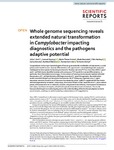Whole genome sequencing reveals extended natural transformation in Campylobacter impacting diagnostics and the pathogens adaptive potential
Golz, Julia C.
Epping, Lennard
Knüver, Marie-Theres
Borowiak, Maria
Hartkopf, Felix
Deneke, Carlus
Malorny, Burkhard
Semmler, Torsten
Stingl, Kerstin
Campylobacter is the major bacterial agent of human gastroenteritis worldwide and represents a crucial global public health burden. Species differentiation of C. jejuni and C. coli and phylogenetic analysis is challenged by inter-species horizontal gene transfer. Routine real-time PCR on more than 4000 C. jejuni and C. coli field strains identified isolates with ambiguous PCR results for species differentiation, in particular, from the isolation source eggs. K-mer analysis of whole genome sequencing data indicated the presence of C. coli hybrid strains with huge amounts of C. jejuni introgression. Recombination events were distributed over the whole chromosome. MLST typing was impaired, since C. jejuni sequences were also found in six of the seven housekeeping genes. cgMLST suggested that the strains were phylogenetically unrelated. Intriguingly, the strains shared a stress response set of C. jejuni variant genes, with proposed roles in oxidative, osmotic and general stress defence, chromosome maintenance and repair, membrane transport, cell wall and capsular biosynthesis and chemotaxis. The results have practical impact on routine typing and on the understanding of the functional adaption to harsh environments, enabling successful spreading and persistence of Campylobacter.

